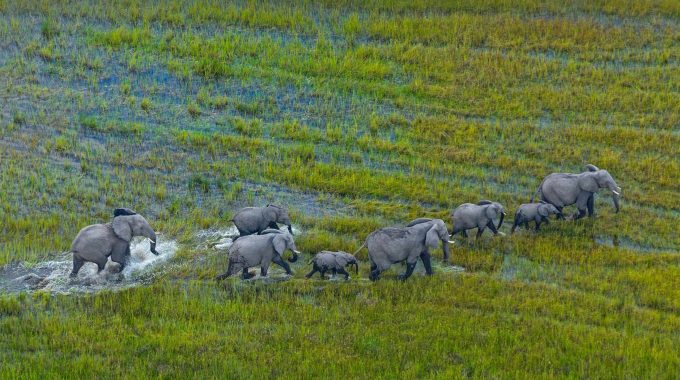Who lives in the Okavango Delta? The Okavango Delta is not only home to a vast array of…
What is the major problem in the Okavango Delta?
What is the major problem in the Okavango Delta? The Okavango Delta faces several environmental and socio-economic challenges that threaten its delicate ecosystem and the livelihoods of those who depend on it. The most significant issues are:

-
Water Scarcity and Climate Change
One of the most pressing challenges for the Okavango Delta is climate change and the resulting water scarcity. The delta’s unique ecosystem depends on seasonal flooding from the Okavango River, which originates in Angola and feeds into the delta. However, changing climate patterns, including irregular rainfall, higher temperatures, and shifts in river flow, are affecting the volume and timing of these floods.
- Reduced Rainfall and Drought: Prolonged droughts or reduced rainfall in the upper reaches of the Okavango River in Angola can lead to lower water levels in the delta. This disrupts the seasonal flooding that sustains the wetland ecosystem, affecting plant and animal life.
- Increased Evaporation: Rising temperatures may increase the rate of evaporation, further reducing the water levels that are vital to the delta’s health.
-
Water Management and Upstream Development
The Okavango River Basin is facing growing pressures from upstream development, particularly the construction of dams and irrigation projects in Angola. These projects have the potential to:
- Alter River Flow: Dams along the Okavango River could control or divert the flow of water into the delta, disrupting the seasonal flooding cycle and affecting the balance of the ecosystem.
- Water Diversion for Agriculture: Increased water extraction for agricultural irrigation and hydroelectric power in Angola could reduce the amount of water flowing downstream into the delta, affecting its size and biodiversity.
While the delta itself is in Botswana, most of the river’s water originates in Angola, making the region highly vulnerable to upstream activities. Efforts to ensure sustainable water management and cooperation between countries in the Okavango River Basin are critical.
-
Poaching and Wildlife Threats
The Okavango Delta has long been a haven for wildlife, including iconic species like elephants, lions, leopards, and rhinos. However, poaching for ivory, tusks, and other animal products remains a significant issue, particularly for elephants.
- Illegal Hunting: Poaching is driven by international demand for wildlife products, particularly ivory. Although Botswana has strong anti-poaching laws and enforcement, the problem persists, especially in remote areas of the delta.
- Human-Wildlife Conflict: As human populations grow and encroach on wildlife areas, there is increasing conflict between people and animals. Elephants, for example, sometimes damage crops or homes when they migrate in search of food and water.
-
Over-Tourism and Unregulated Development
The Okavango Delta is a world-renowned tourism destination, attracting visitors for its unparalleled wildlife and breathtaking landscapes. While tourism can be a vital source of income for the region, it can also pose risks if not managed sustainably.
- Unregulated Tourism: In some cases, uncontrolled development and over-tourism can lead to environmental degradation. The construction of lodges, roads, and airstrips can fragment habitats, disturb wildlife, and contribute to pollution.
- Pressure on Local Resources: High visitor numbers can lead to the overuse of natural resources (water, land, etc.), and waste management can become a concern in more remote areas.
- Impact on Local Communities: In some cases, local communities may not always benefit equitably from tourism. While eco-tourism has the potential to provide jobs and stimulate the economy, it can also lead to social disparities and tensions over land use and resources.
-
Invasive Species
Invasive plant species, such as water hyacinth and parrots feather, are increasingly becoming a threat to the Okavango Delta’s delicate water ecosystem. These species can:
- Outcompete Native Vegetation: Invasive species can overrun the delta’s waterways, reducing biodiversity and changing the structure of the ecosystem. They often grow quickly and block access to water for animals, affecting feeding habits and overall habitat quality.
- Alter Water Quality: Some invasive plants can degrade water quality by altering nutrient cycles or blocking oxygen flow, which in turn affects aquatic life.
-
Population Growth and Development Pressures
As Botswana’s population grows, there is increased pressure on the land and water resources in the Okavango Delta. Local communities living near the delta depend on the wetland for agriculture, fishing, and livestock grazing, which can sometimes conflict with conservation efforts. Unsustainable land use and deforestation for agriculture can result in the degradation of the surrounding environment, putting additional pressure on the delta’s ecosystem.
- Agricultural Expansion: There are concerns that expanding agricultural activity, especially in the periphery of the delta, could lead to increased water extraction, land clearing, and contamination of water sources, all of which would disrupt the delta’s balance.
-
Loss of Biodiversity
The Okavango Delta is known for its exceptional biodiversity, including some species that are threatened or endangered. However, the combined pressures of poaching, climate change, habitat loss, and human encroachment are threatening this rich variety of life. Species such as the African wild dog, cheetah, and rhino are especially vulnerable.
In Summary:
The Okavango Delta faces multiple interlinked challenges, including climate change, upstream development (such as dams and irrigation), poaching, unsustainable tourism, and human-wildlife conflict. The biggest concern, however, is the long-term sustainability of its water source, as changes in the flow of the Okavango River could have catastrophic effects on this unique ecosystem.
Efforts are underway through international collaborations (e.g., the Okavango River Basin Commission), national conservation programs, and eco-tourism initiatives to mitigate these threats. However, the challenges remain significant, and continued conservation and sustainable management are critical to preserving the Okavango Delta’s ecological integrity for future generations.



